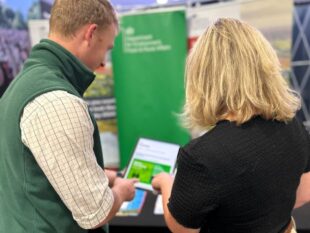https://defrafarming.blog.gov.uk/north-cumbria-farmers-group-transcript/
Transcript: North Cumbria Farmers Group
Transcript
Chris Turner, Farm Adviser, Natural England
Part of the value of the test and trial is to see what we learn from each other, and what's worked well and what doesn't work well.
Peter Faulder, Facilitator, Forgotten Lands Test & Trial
So we organised a workshop. Cumbria Biodiversity Data Centre, who've been doing the mapping for us, identifying the different farmland habitats, explaining about them and the species that we’ve found there. And from that it just gives the farmers a baseline of mapping the natural capital on their own farms.
Chris Turner
We're doing the test part, ‘Test and Trial’. So we're testing out whether it's possible for farmers to be able to measure the natural capital value of their farm.
David Watson, Parcelstown Farm, Cumbria
David Watson. I farm just south of Longtown on the banks of the River Lyne. I have about 100 acres and 60-70 suckler cows. We're basically replacing the present subsidy system with a completely new system that is being, as we speak, is being drawn up. We're trialling ways of collating the information which will demonstrate what public goods we have on the farm, and attending workshops looking at the soil structure and the variety of species in the sward.
Chris Turner
If we're putting in these herbal lays, with things that are going to punch a root deep, there's good soil down there, how much is actually punching down into the subsoil? Something like that, you know, and you can give it a wee shatter test and see how it's breaking up. So essentially, if you get a lot of horizontal cracking, that's a bad sign, if you get a lot of vertical cracking, that's a good sign, because we want water to go down.
David Watson
Observation is the big part of it. You're looking at what wildlife you have on the farm, what environments are useful for the habitats and the flora and fauna, and when you see curlews, or whatever, flying around, remembering to note it down so that you can pass it on.
Peter Faulder
My favourite thing is, if you look after soil, air and water, everything else should fall into place because they're the fundamental things.
David Watson
I've got hedgerows and the riverbanks, but I haven't got as many inaccessible nooks and crannies, shall we say, that I can just leave alone. Basically it's all productive ground. The carbon capture and the rotational grazing are probably my big points that I need to concentrate on. The big companies that need to purchase carbon credits, we have a natural carbon sink. We should be able to, not get rich, but we should be able to help replace some of the subsidy money by, in my case, rotational grazing, and putting as much carbon back into the soil.
I've got to try and work out how to farm my land in such a way that I'm maximising the production in terms of sales of cattle, but also maximising the habitats that allow me to capture carbon, attract as much wildlife as I can, within the limit of needing to have a productive pasture. If I can go to the auction and send a ring full of cattle in that are good, and a lot of people want to buy them, there's pride in that, in the quality of the cattle, or the amount of milk if you're a dairy farmer, or the quality of the lamb, you know, if sheep are your specialism.
Nobody wants to be an average farmer. Everybody thinks they're as good as they can be. And it's the same with the trial. Everybody's trying to find as much as they can that fits into this public money for public goods.



 The
The 